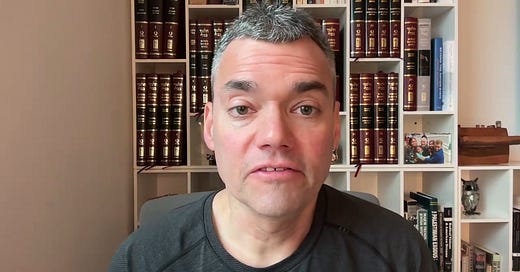I’ll be on book tour for Being Jewish After the Destruction of Gaza for the next couple of months. You’ll find a list of book-related events below.
I’m happy people are reading my book. But I know that many talented Palestinian authors don’t get the same attention. So, I hope people who buy my book also buy one by a Palestinian author. For instance, the latest work by the brilliant essayist, Raja Shehada, What Does Israel Fear from Palestine?
I hope readers also donate to people in Gaza. For instance, Hossam and Mariam Alzweidi, who were severely injured along with their four children by Israeli bombs and have been displaced ten times since October 7th. They’re trying to raise the money to seek medical care in Egypt. Their GoFundMe page is here.
Friday Zoom Call
This Friday’s zoom call, for paid subscribers, will be at 1 PM Eastern on Friday, our regular time. Our guest will be Munther Isaac, the renowned Palestinian minister from Bethlehem. We’ll discuss his new book, Christ in the Rubble: Faith, the Bible and the Genocide in Gaza. We’ll also discuss why so many American evangelicals unconditionally support Israel, and what Christians should do to honor the dignity of everyone between the Jordan River and the Mediterranean Sea.
Friday’s zoom call is for paid subscribers.
Book Tour
(We’ll update this every week.)
On Monday, April 7, I’ll be speaking at the Harvard Divinity School.
On Tuesday, April 8, I’ll be speaking at the Harvard Kennedy School, and then later that night, at First Parish in Cambridge, Massachusetts, with the Palestinian human rights activist, Issa Amro.
On Wednesday, April 9, I’ll be speaking at United Parish in Brookline, Massachusetts.
On Wednesday, April 16, I’ll be speaking via Zoom to Scientists for Palestine.
On Monday, April 21, I’ll be speaking with Sahar Aziz at the University of Wisconsin at Madison.
On Tuesday, April 22, I’ll be speaking with Pankaj Mishra at New York University.
On Tuesday, April 29, I’ll be speaking twice in Washington, DC: with Khaled Abu El Fadl at Noon at Georgetown University and at 6 PM with Mehdi Hasan at Busboys and Poets.
On Wednesday, April 30, I’ll be speaking with Barnett Rubin via Zoom to the Willoughby Wallace Memorial Library.
On Sunday, May 4, I’ll be speaking at Kehilla Synagogue in Oakland/Piedmont, California.
On Monday, May 12, I’ll be speaking at Parkdale Hall in Toronto.
On Tuesday, May 13, I’ll be speaking at the Woodstock Jewish Congregation.
On Sunday, May 25, I’ll be speaking with Debbie Whitmont at the Sydney Writers Festival in Sydney, Australia.
On Tuesday, May 27, I’ll be speaking at the Wheeler Center in Melbourne, Australia.
Book Reviews
Being Jewish After the Destruction of Gaza was reviewed (along with ten other books!) by Omer Bartov in The New York Review of Books.
Things to Read
(Maybe this should be obvious, but I link to articles and videos I find provocative and significant, not necessarily ones I entirely agree with.)
In Jewish Currents (subscribe!), I wrote about Chuck Schumer’s new book about antisemitism.
For the Foundation for Middle East Peace’s Occupied Thoughts Podcast, I interviewed Ahmed Moor about his Guardian article about child amputees in Gaza.
A video of last week’s Smol Emuni (Religious Left) Conference in New York.
The children of Columbia’s first Jewish president denounce its capitulation.
See you on Friday,
Peter
VIDEO TRANSCRIPT:
So, there’s been a lot of attention in the press to these protests against Hamas. I’d encourage people who are interested in the conversation to listen to the video I did on Friday, the interview I did with Mohamed Shahada, who I thought had really, really interesting insights into that whole dynamic. But, you know, it will reinforce the tendency of some supporters of Israel to say, this is a war of Israel against Hamas, not against the Palestinian people. After all, look, these Palestinians in Gaza are protesting against Hamas. They don’t like Hamas. And, as Mohammed pointed out to me when we talked, it’s certainly true. There have been protests that many Palestinians don’t like Hamas. There have been protests against Hamas for a bunch of years now. Hamas is authoritarian, you know, incompetent in various ways. Many people rightly don’t like their Islamist ideology, which they feel as considered to be illiberal and oppressive.
But I still think it’s just fundamentally wrong to say that the war that Israel is waging is against Hamas for a number of reasons. First of all, if you just look at the military tactics that Israel is using, they’re clearly—some of them—not only directed at Hamas. So, Israel has been for the last month now denying humanitarian aid into Gaza—to everyone in Gaza, not just to the Hamas people, to everyone in Gaza. Israel is always also actively advocating the idea of mass migration, mass expulsion out of Gaza for everybody, not just for members of Hamas. And Israel is also repressing pretty brutally the West Bank, where Hamas is not in charge. There have been tens of thousands, according to reports, of people expelled from their homes in the West Bank, where Hamas is not in charge, right.
So, all of that alone, I think, makes it pretty difficult to suggest that this is a war only against Hamas. In addition to that, if Israel really were interested in opposing merely Hamas, and let’s say even just getting rid of Hamas—if that was Israel’s primary objective—then one might think that Israel would support these protests against Hamas by telling Palestinians in Gaza that if they got rid of Hamas, then actually their lives could be better. Imagine if Israel said, well, if you get rid of Hamas, we will support a mass reconstruction for Gaza. We will not support expulsion. We will not maintain these buffer zones and blockade that make it impossible for Gaza to have any economic future, maybe we would even begin negotiations based on the idea of giving Palestinians eventually their state, or something like this, right.
You can imagine a whole series of things that Israel could do to basically say to Palestinians, Gaza, listen, we’re being really tough on you because of Hamas. But listen, if you manage to get rid of Hamas, then we’re going to have a completely different kind of future for you, right. Which would presumably strengthen the protest movement against Hamas. Israel said none of that, right. Israel still is openly advocating still mass expulsion of everybody from Gaza. Beyond that, if Israel really, really wanted to weaken Hamas in general, there are many things that Israel could have done over many years, right.
So, Israel for years has had the opportunity to release Marwan Barghouti from jail. I interviewed Arab Barghouti, his youngest son, a couple of weeks ago, right. We know from polling that Marwan Barghouti, who was not an Islamist, is more popular than Hamas. So, if you really wanted to weaken Hamas politically, you could let their most formidable rival out of jail. Israel also, for many, many years, could have supported the Palestinian Authority, which was pursuing a different strategy than Hamas. The Palestinian Authority had leaders—Mahmoud Abbas and Salam Fayyad—who had recognized Israel. They were working with Israel to prevent armed resistance from the West Bank. And yet, Fayyad in particular, who was prime minister from 2007 to 2013, who was really quite popular in Israel and American Jewish circles because he was so moderate. If you look at the interview he did with Roger Cohen of the New York Times, when he left Palestinian politics, he basically said, I was defeated by Israel. Even though I did everything they wanted, I couldn’t get them to stop settlement growth for a single day. And he literally says in that interview that Hamas will be strengthened.
So, you notice sometimes in the press, sometimes people call this war Israel vs. Hamas. And sometimes, they say it’s a war of Israel vs. Gaza. I really think it’s much more accurate to say it actually is a war of Israel vs. Gaza. It’s not to say that Israelis and Israeli leaders don’t have a special hostility to Hamas, given the horrors of what Hamas did on October 7th. Of course they do. If you look both militarily and politically at the way Israel is behaving, I just don’t see how one can come to the conclusion that this is a war that is directed only at the defeat of Hamas and not at, in some ways, the defeat, even the degradation, even the destruction, of Palestinians in Gaza and even beyond.











Share this post